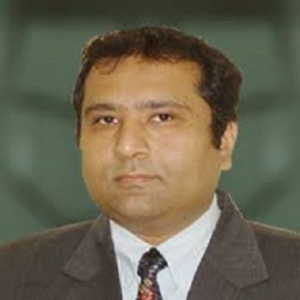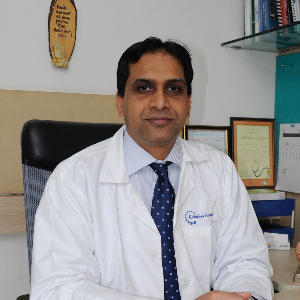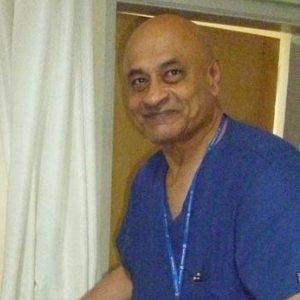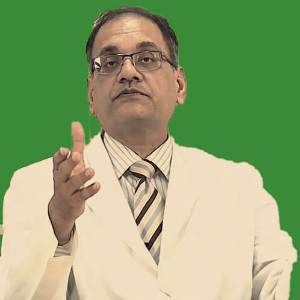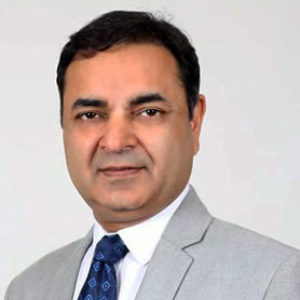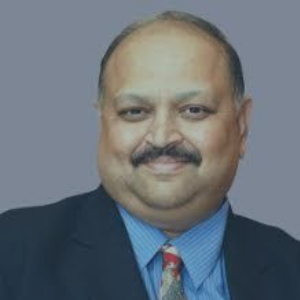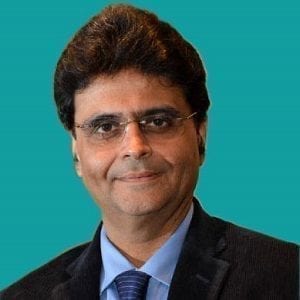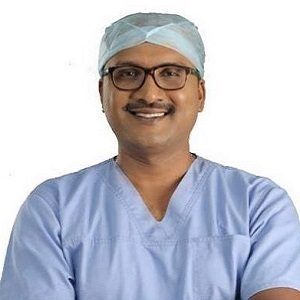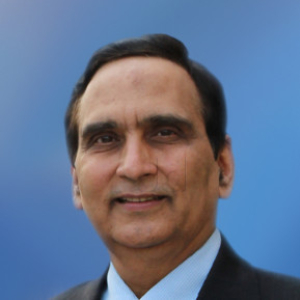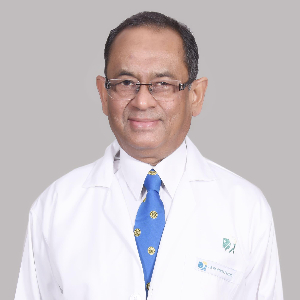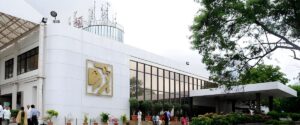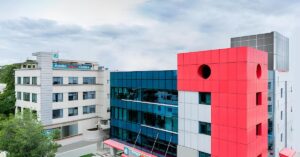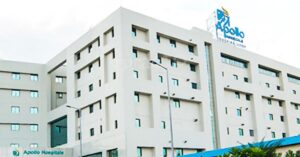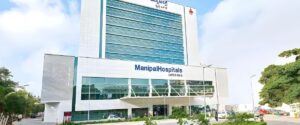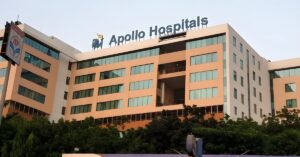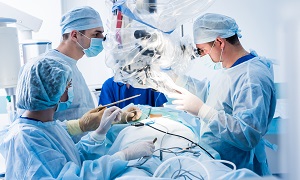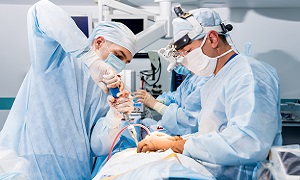Best Spinal Cord Stimulator Implant Doctors in India
- Neurosurgeon, Gurugram, India
- 20 + years’ experience
- Medanta-The Medicity, Gurgaon
Profile Highlights:
- Dr. Sudhir Dubey is a distinguished neurosurgeon with an illustrious career spanning decades, marked by groundbreaking contributions to the field of neurosurgery.
- As the Chairman of Neurosurgery at Medanta, Gurugram, Dr. Dubey has performed over 10,000 neurosurgical operations, solidifying his reputation as one of the foremost experts in the field.
- Dr. Dubey’s academic journey is as impressive as his clinical achievements. He graduated with top honors from King George’s Medical College, where he was awarded the prestigious Sir Rupkishan Das Gold Medal in his final year of MBBS.
- Top Neuro Surgeon & Spine Surgeon | Kokilaben Hospital, Mumbai, India
- 26+ Years Experience
- Kokilaben Dhirubhai Ambani Hospital
Profile Highlights:
- Dr. Abhaya Kumar is a leading name in the field of Neurosurgery in India and is currently associated with Kokilaben Dhirubhai Ambani Hospital, Mumbai as the Head and Consultant of Neurosurgery and Minimally Invasive Spine Surgery.
- He is an expert in Minimally Invasive Spine Surgery, Brain surgery, and Stereotactic Radiosurgery. He has performed more than 3500 spine surgeries and 5500 brain surgeries in KDAH alone.
- His primary focus includes Minimally Invasive Spine Surgery (MISS). Till date, he has handled over 2500 Minimal Invasive spine cases in the hospital with an outstanding success record.
- In addition, he has treated over 300 cases of Craniovertebral Junction anomalies and performed surgeries for approximately 3000 brain tumors and over 500 spinal cord tumors. He frequently utilizes advanced technologies like Intraoperative MRI (IMRIS), neuro-navigation, stereotaxy, and neuroendoscopy in his procedures.
- Top Orthopedic Surgeon & Spine Surgeon | Apollo Hospital, New Delhi, India
- 30+ Years Experience
- Indraprastha Apollo Hospital, New Delhi
Profile Highlights:
- Dr. Rajagopalan Krishnan is a well-known orthopedic and spine surgeon in India.
- He is one of the most highly accomplished and successful spine surgeons in Delhi performing more than 350 spine surgeries every year.
- He provides management and treatment of spinal disorders that includes disc and degenerative disorder, spinal tumor, spinal fractures, spinal trauma, and spinal infections.
- Orthopedic Surgeon & Spine Surgeon, Gurugram, India
- Over 28 years’ experience
- Medanta-The Medicity, Gurgaon
Profile Highlights:
- As the Director of Orthopaedics at Medanta, The Medicity in Gurugram, Dr. Mathur has been instrumental in establishing a state-of-the-art Spine Unit at the hospital, performing around 400 surgeries annually.
- Dr. Vineesh Mathur is a distinguished Orthopaedic Spine Surgeon with over 28 years of experience.
- He has a remarkable track record of more than 6,000 successful surgeries.
- Top Neurosurgeon and Spine Surgeon | Apollo Hospital, New Delhi, India
- 33+ Years Experience
- Indraprastha Apollo Hospital, New Delhi
Profile Highlights:
- Dr. Sudheer Kumar Tyagi is a highly esteemed Neurosurgeon with over 33 years of exemplary experience in the field of neurosurgery.
- Affiliated with Apollo Hospitals Indraprastha in New Delhi, Dr. Tyagi holds an MBBS, MS, and MCh in Neurosurgery.
- His career is marked by a dedication to advancing neurosurgical techniques and improving patient outcomes through precise and innovative surgical practices.
- Orthopedic Surgeon & Spine Surgeon, Mumbai, India
- Over 20 years’ experience
- Reliance Hospital Navi Mumbai
Profile Highlights:
- Dr. Gautam Zaveri is one of the best spine surgeons in India today and has performed over 3000 spinal surgeries for the treatment of spinal fractures, trauma, slipped discs, kyphosis, scoliosis, sciatica, spondylolisthesis, and spinal stenosis.
- Dr. Zaveri specializes in Minimally Invasive Spine Surgeries commonly known as MISS and performs most of his procedures using this technique to minimize cuts and speed up the recovery process.
- Orthopedic Surgeon & Spine Surgeon, Mumbai, India
- Over 25 years’ experience
- Lilavati Hospital & Research Centre
Profile Highlights:
- Dr. Ram Chaddha is a specialist Spine Surgeon in Mumbai with expertise in the management and treatment of all kinds of spinal disorders for over 25 years.
- Dr. Chaddha is trained in Minimally Invasive Spine Surgery and is also among the few surgeons in India to hold expertise in Minimally Invasive Cosmetic Spine Surgery.
- Dr. Ram Chaddha spent a considerable number of years training undergraduate and postgraduate students and has also been an examiner for such courses at Mumbai University.
- Orthopedic Surgeon, Chennai, India
- Over 21 years’ experience
- Apollo Hospitals Greams Road
Profile Highlights:
- Dr. A Navaladi Shankar is a well-known spine surgeon and orthopedist in Chennai with 21+ years of experience.
- He completed an MBBS from Al-Ameen Medical College, MNAMS from the National Board of Education, and a Diploma from Sri Ramachandra Medical College and Research Institute.
- Dr. Shankar holds expertise in Laminectomy, Lower Back Pain and Neck Pain Treatment, Arthritis Management, and Trauma Surgery.
- Top Neurosurgeon | Apollo Hospitals, New Delhi, India
- 35+ Years Experience
- Indraprastha Apollo Hospital, New Delhi
Profile Highlights:
- Dr. S.K. Sogani is a highly respected Neurosurgeon with over 35 years of experience, currently affiliated with Apollo Hospitals Indraprastha in New Delhi.
- Holding an MBBS, MS, and MCh, Dr. Sogani is renowned for his expertise in treating complex neurosurgical conditions such as craniosynostosis, epilepsy, multiple sclerosis, and Moyamoya disease.
- His surgical prowess extends to intricate procedures like craniotomies, spinal fusions, and pediatric neurosurgeries, with over 5,000 successful cases to his credit.
- Top Neurosurgeon & Spine Surgeon | Apollo Hospital, New Delhi, India
- 30+ Years Experience
- Indraprastha Apollo Hospital, New Delhi
Profile Highlights:
- Dr. Rajendra Prasad is one of the most experienced Neurosurgeons and Spine surgeons in India.
- Dr. Rajendra Prasad is an expert in all neuro and spine surgeries that including micro neurosurgery, minimally invasive spine surgery, surgery for degenerative spine diseases, surgery for brain and spine trauma, and neuro tumor surgeries.
Best Spinal Cord Stimulator Implant Hospitals in India
- City: New Delhi, India
Hospital Highlights:
- Equipped with 650 beds, BLK-Max Super Speciality Hospital is the largest stand-alone private sector hospital in Delhi.
- With over 1500 healthcare providers and 150 globally renowned super specialists, the hospital is one of Asia’s largest BMT Centres. The hospital is known for having some of the best cancer doctors in the country.
- The hospital is NABH and NABL accredited and was inaugurated by the first Prime Minister of India. Pt. Jawahar Lal Nehru.
- City: Hyderabad, India
Hospital Highlights:
- Located in the vibrant city of Hyderabad, Apollo Health City is a world-renowned medical facility that provides outstanding care and treatment to patients coming from different parts of the world.
- Founded in 1988, this 550-bed multispecialty hospital with 50 specialties and 12 Centres of Excellence continues to deliver outstanding outcomes for patients with the simplest to the most complicated medical conditions.
- Backed by the latest medical equipment and a dedicated team of professionals, the hospital provides comprehensive treatment across various specialties including, cardiology, critical care, neurosciences, cancer, orthopedics, gynecology, ENT, transplants, gastroenterology, etc.
- Apollo Health City is a cutting-edge healthcare facility that combines various facilities under one roof. These may include state-of-the-art physical medicine, rehabilitation, and wellness services with education, research, telemedicine, innovative medical devices, disease management programmes, and medical talents.
- The hospital is known for offering top-notch cancer treatment accompanied by cutting-edge facilities and technology.
- The hospital also offers a broad spectrum of cosmetic procedures that improve not just appearance but also comfort.
- In 2011, Apollo Health City was the recipient of the Asian Hospital Management Award (AHMA).
- In 2013, the Government of India recognized Apollo Health City as the top medical tourism destination in the country.
- City: Mumbai, India
Hospital Highlights:
- Kokilaben Dhirubhai Ambani Hospital, Named after the wife of Indian industrialist Dhirubhai Ambani, the founder of Reliance Industries, this is one of the top hospitals in Mumbai. This 750-bed multi-specialty hospital became operational in 2009. Known as one of India’s most advanced tertiary care facilities, the hospital is designed to raise India’s global standing as a healthcare hub, with an emphasis on excellence in clinical services.
- Kokilaben Dhirubhai Ambani Hospital uses Protocol and Care Pathway based treatment models to ensure the best outcomes for patients.
- The hospital represents a confluence of top-notch talent, cutting-edge technology, state-of-the-art infrastructure, and, most importantly commitment.
- The hospital also holds the accreditation of the NABH, NABL, CAP, and JCI.
- The hospital has been recognized as the No. 1 Multispecialty Hospital in Mumbai and the West Zone for the fifth year in a row in 2020 by The Week.
- City: Chennai, India
Hospital Highlights:
- Apollo Cancer Centre in Teynampet, Chennai is one of the best super speciality hospitals in India. It is the country’s first ISO-certified healthcare facility.
- Additionally, it is the first hospital in Chennai and the first oncology hospital in India to receive NABH accreditation.
- The hospital provides advanced tertiary care in oncology, orthopedics, neurology and neurosurgery, head and neck surgery, and reconstructive and plastic surgery.
- Additionally, it offers specialized healthcare of international standards with results comparable to those of the best hospitals in the world.
- It is outfitted with 300 beds, the newest and greatest technology, a large pool of highly qualified specialists, and a committed team of medical and paramedical professionals.
- It is one of the first few medical facilities in India to offer comprehensive cancer care. A team of skilled medical, surgical, and radiation oncologists makes up the Tumour Board, which is a component of the complete treatment planning system. After reviewing reported cases, the Board determines in concert with diagnostic specialists what course of action is best for each individual patient. The panel is further supported by dieticians, medical counselors, speech therapists, and other pertinent specialists.
- The hospital launched the first ExcelsiusGPS® Spine Robot in South India and has completed over 50 surgeries till date.
- It is also one of the few cancer hospitals in India to offer Cyber Knife therapy. Till now it has completed 1320 Cyber Knife therapies.
- The institution is also one of the few in India with the capacity to do transplants and find a prospective unrelated donor. The hospital has performed over 1000 BMTs till now.
- Furthermore, it has an exceptional milestone of performing exultant Micro vascular free tissue transfer and Aesthetic surgeries on more than 1000 patients with success.
- City: Chennai, India
Hospital Highlights:
- Apollo Hospitals, Chennai, is one of the best hospitals for heart care in India. Over the years, Apollo has expanded all over India, as a healthcare chain.
- India’s first ‘Only Pancreas’ transplant was performed in Apollo Hospital. The hospital is known for successfully performing Asia’s first en-bloc combined heart and liver transplant, and over the years, it has attained a remarkable achievement in the global healthcare space. Around 3-4 organ transplants are performed in the hospital per day.
- Equipped with over 500 beds, this hospital in Chennai was established in 1983 and since then has been among the most preferred hospital for patients from all over the world.
- The hospital holds accreditation of the NABH and JCI and is the first hospital in India to be ISO 9001 and ISO 14001 certified. It is also the first South Indian Hospital to receive subsequent reaccreditation from the JCI USA 4 times.
- City: Chennai, India
Hospital Highlights:
- Established in 1999, Gleneagles Global Hospital, Chennai, is one of the top healthcare facilities in Southern India. It is part of the Gleneagles Hospital Chain, which is the fourth largest healthcare chain in the country. The hospital specializes in multi-organ transplants of kidneys, liver, lungs, heart, etc.
- The hospital has an excellent infrastructure and state-of-the-art lab and equipment set-up. The hospital boasts cutting-edge technologies, a highly skilled team of doctors and surgeons, and trained support staff. Located in Perumbakam, Chennai, it is one of India’s premier health care destinations. The hospital has performed some of the most complex surgical and clinical procedures in India including multi-organ transplantations.
- The hospital’s lung transplantation program is one of the best in the country. The hospital is known for having performed India’s first single lung transplant and first minimal invasive lung transplant. It is also the only Indian hospital to be associated with King’s College Hospital, London, United Kingdom for liver transplantations.
- City: Hyderabad, India
Hospital Highlights:
- KIMS Hospital (a brand name of Krishna Institute of Medical Sciences) is one of the largest and best multi-speciality hospitals in Hyderabad. The hospital provides various treatments to an enormous number of patients.
- The hospital has a capacity of more than 3000 beds. KIMS Hospitals offers different healthcare services in more than 25 specialities and super specialities.
- The hospital is equipped with modern medical equipment and technology. It has robotic equipment to provide minimal invasive techniques for patients.
- The hospital is aimed at providing world-class healthcare facilities and services at an affordable cost for patients.
- The various specialities and departments of the hospital include neurosciences, gastroenterology & hepatology, robotic science, reproductive sciences, dental science, oncological sciences, organ transplantation, heart and lung transplantation and mother and child care.
- City: Kolkata, India
Hospital Highlights:
- Established in 2003, Apollo Gleneagles Hospitals is a 750-bed multispecialty tertiary care hospital situated in Kolkata.
- With 33 Centres of Excellence and more than 50 specialties, Apollo Gleneagles Hospitals, Kolkata is capable of handling all sorts of patients.
- This tertiary care hospital, which is a 100% subsidiary of Apollo Hospitals Enterprise Ltd., India, is regarded as one of Kolkata’s top hospitals.
- The facility is a complete blend of cutting-edge technology, state-of-the-art infrastructure, and genuine hospitality.
- Focusing on numerous specialties, the hospital provides all-inclusive medical treatments supported by cutting-edge technology and a staff of highly qualified medical specialists.
- Patients across the globe come to Apollo Gleneagles Hospitals Kolkata for their treatment. Moreover, international patients receive full attention and assistance for their treatment and are provided with a hassle free experience.
- Apollo Gleneagles Hospitals, Kolkata is the only hospital in Eastern India to hold the Joint Commission International (JCI) certificate.
- It is also the only hospital in Kolkata to hold the NABL accreditation in six different categories, which includes Clinical Biochemistry, Clinical Pathology, Hematology & Immunohematology, Microbiology & Serology, and Histopathology & Cytopathology.
- Furthermore, Apollo Gleneagles Hospitals, Kolkata is known for performing the first ever Reverse Shoulder Prosthesis Replacement in East India.
- City: Bengaluru, India
Hospital Highlights:
- Established in 1991, Manipal Hospital, Old Airport Road, Bangalore is the flagship facility of the Manipal Hospitals Group, which is one of the largest networks of Multispecialty Private Hospitals in India.
- The facility is well-known for its state-of-the-art technology, performance-driven, patient-centric, and evidence-based approach.
- The facilities offered at Manipal Hospital meet the highest international standards, allowing the hospital to attract a large number of national and international patients.
- Their expertise encompasses the diagnosis and treatment of a wide range of diseases in several specializations that address both simple as well as complex medical procedures.
- There are total 600 beds accessible in the hospital for the in-patients so they may heal while being closely watched after by the medical team. In addition, it has 144 critical care units, including NICUs, ICCUs, and ICUs. Apart from that, the hospital also offers 20 contemporary, modular state-of-the-art operating rooms with all the amenities needed.
- The hospital has several departments that are overseen by highly skilled, certified, and experienced medical experts.
- One of the best departments in the hospital is that of the Cancer department which is known for its advanced cancer diagnosis and treatment facilities such as Intracavitary Chemotherapy, Biological Therapy, HIPEC, PIPEC, Nuclear Medicine, Radiation Therapy, etc.
- It is one of the few hospitals in Bangalore that provides full range of pediatric services, including pediatric emergency services, pediatric gastroenterology, pediatric neurology, pediatric cardiology, pediatric orthopaedics, pediatric allergies, pediatric immunology, and infectious diseases.
- Furthermore, Manipal Hospital, Old Airport Road, Bangalore is also regarded as one of the best hospitals for bone and spine related disorders.
- City: Mumbai, India
Hospital Highlights:
- Established in 2016, Apollo Hospitals, Navi Mumbai is one of Maharashtra’s most advanced multispecialty hospital. This 500-bed hospital provides sophisticated treatments and integrated super specialty services under one roof.
- The hospital features a cutting-edge infrastructure that houses 13 state-of-the-art operating rooms, advanced laboratory and medical diagnostics, and 120 ultra-modern I.C.U. beds, including N.I.C.U. and P.I.C.U., monitored round the clock by critical care specialists.
- With 57 specialties and subspecialties, the hospital boasts a team of renowned medical specialists who offer accurate diagnosis and treatment with easy accessibility to their patients.
- Additionally, the hospital offers highly customized, individualized health check programs that are made to fit each person’s needs in terms of lifestyle.
- Apollo Hospitals, Navi Mumbai has been accredited by both the National Accreditation Board for Hospitals and Healthcare Providers (NABH) and the Joint Commission International (JCI).
- Apollo Hospitals Navi Mumbai has been awarded the “Best Practices-International Services Award” at the annual awards for service excellence and operations excellence.
Spinal Cord Stimulator
Spinal cord stimulator is an implanted device that can deliver low levels of electric signals directly into the spinal cord, which helps to relieve pain. Spinal cord stimulation is often used after nonsurgical pain treatment options fail to provide sufficient relief. Spinal cord stimulators require two procedures for testing as well as implanting the device, the trial and the implantation. It can help one to improve their overall quality of life and it also reduces the need to use any kind of pain medicines. It is typically used with other pain management treatments.
Purpose
Spinal cord stimulation is used if nonsurgical pain treatment options fail to provide enough relief. Spinal cord stimulators are used for treating or managing various types of chronic pain, which includes:
- Back pain, that continues even after surgery (failed back surgery syndrome)
- Post-surgical pain
- Heart pain (angina) untreatable by other means
- Arachnoiditis (painful inflammation of the arachnoid)
- Injuries to the spinal cord
- Peripheral vascular disease
- Nerve-related pain (which can include severe diabetic neuropathy and cancer-related neuropathy from radiation, surgery or chemotherapy)
- Complex regional pain syndrome
- Pain after an amputation
- Visceral abdominal pain and perineal pain
Spinal cord stimulation can help you improve your overall quality of life and sleep as well as reduce the need for pain medicines. It can be used along with other kinds of pain management treatments, which include medications, physical therapy, exercise and relaxation methods.
Spinal Cord Stimulator Types
Spinal cord stimulators can be of various types:
Conventional implantable pulse generator (IPG), a spinal cord stimulator which is operated by battery. During the operation, the batter is placed in the spine. When it runs out, the battery needs to be replaced with a different surgery. This device is usually a good choice for people who are experiencing pain in just one body part due to its lower electrical output.
Rechargeable IPG functions similarly to the conventional device. Its difference is that the battery can be recharged without the need for another surgery. As the energy source is rechargeable, these stimulators are able to put out more electricity. This option is better for people experiencing pain in the lower back or in one or both legs, as the signal can reach further.
Radiofrequency stimulator uses a battery located outside the body. Due to newer designs and better technology, this stimulator is used quite rarely today. It has rechargeable batteries and is similar to the rechargeable IPGs. It is a better option for people with pain in the lower back and legs due to the device’s power.
Your surgeon will be explaining how to operate the device as well as adjust the intensity of the electrical signal, which all three types of stimulators are able to support. Different stimulator settings are required for different body positions. One setting can work better for sitting and another one for walking.
In order to help you easily access the settings which are used mostly, most devices allow doctors to save two or three preset programs. Some newer devices feature several waveforms for electricity delivery, which includes high frequency, burst as well as high-density stimulation.
Procedure
The procedure for spinal cord stimulation requires two steps to test and implant the device: the trial and the implantation. It is usually performed on an outpatient basis.
Spinal Cord Stimulator Trial
The first step is considered a trial period. In this step, your surgeon will implant a temporary device which will be testing out. You will be guided by a particular kind of X-ray called fluoroscopy. Then your surgeon will carefully insert the electrodes in the epidural space of the spine. The location of your pain affects where these electrodes will be placed along the spine. Your surgeon may ask for your feedback during the procedure to position the electrodes in the most effective way.
This trial procedure usually requires just one incision in your lower back for placing the electrodes. The generator/battery will be outside your body, typically on a belt which you will be wearing around your waist.
For around a week, you will evaluate how well the device can reduce your pain. The trial can be considered a success if you experience at least a 50 percent reduction in your pain level.
However, if it is unsuccessful, the wires can be removed quite easily in the clinic without causing any damage to the spinal cord or nerves. If successful, then surgery will be scheduled to implant the device permanently.
Spinal Cord Stimulator Implantation
Next comes the permanent implantation procedure, where the generator will be placed underneath your skin and the trial electrodes will be replaced with sterile electrodes. Unlike the trial ones, these will need to be anchored by sutures so that their movement can be minimized.
Typically around 1-2 hours can be required for the implantation.
First local anesthesia will be administered, after which your surgeon will make one incision for holding the generator and another one for inserting the permanent electrodes. Fluoroscopy will also be used in order to determine where the electrodes need to be placed.
Once the generator and the electrodes are connected to and running, your surgeon will be closing the incisions.
Your surgeon might provide sedation so that you remain comfortable. He/she might also ask for your feedback during the placement of the electrodes.
Recovery
Once the anesthesia has worn off, most patients are able to leave the same day as their procedure. For several days after your surgery, your incisions can cause some pain. Dressings will be placed over your incision sites and they will remain for about 3 days. The incisions should heal within 15-30 days after the surgery.
Your doctor will next discuss your recovery plan with you and might recommend you lighter activity for around 2 weeks after the surgery.
After your surgeon approves you for any kind of regular activity, you will be able to return to work and drive again.
Risks and complications
Although rare, spinal cord stimulator surgery has few risks and complications. Few patients might experience any of the following:
- Bleeding
- Infection, which can occur in the first 15-60 days
- Device migration (i.e. the electrodes moving from their original location which can make the stimulator unable to block pain as effectively). This might require a follow-up surgery so that the electrodes can be put back in their proper spot.
- Device damage (e.g., sometimes, the stimulator can break due to a fall or intense physical activity).
- Dural puncture- The dura mater surrounds your spinal cord. Spinal cord stimulators are inserted in the epidural space, the area which is just outside your dura mater. If a needle or electrode goes too deep and pierces it, this can lead to cerebrospinal fluid leaking out. These punctures can lead to severe headaches.
- Spinal cord trauma- Although it is rare, spinal cord stimulator insertion can sometimes lead to nerve injury and sometimes even paralysis.
Before going through the operation, it is best to discuss with your doctor regarding the benefits and the risks of the procedure.

